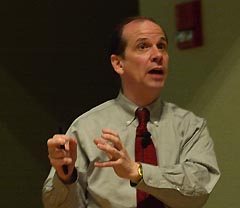|
This is an archived
article. For the latest news, go to the Advance Homepage
For more archives, go to the Advance Archive/Search Page. |
||
|
Medical Strides Push Society Into It's hard to sit down with a couple expecting a child and tell them there is a problem, says Dr. Mark Hughes. "It's even harder," he adds, "if they already have a child who is suffering from an incurable, inherited disease."
Hughes, a professor of molecular medicine and genetics, obstetrics, gynecology, and pathology at Wayne State University, spoke on "Human Reproductive Genetics: The Science, the Medicine, and the Ethical Challenges," April 28 in the Chemistry Building. The lecture was the first in the Chancellor's Distinguished Lecture Series. Hughes said that until recently, couples that carried genes for deadly diseases had few options. "Most families in this situation elected not to have any kids," he said. "They weren't going to throw the genetic dice and take a chance. Some would adopt, and that's wonderful. Some would use artificial insemination with sperm of an anonymous donor, and more people do that than you would imagine. If they opt for children, they have 15 weeks of super-high anxiety while they're trying to decide whether they want a prenatal test like amniocentesis or not." Hughes, director of the State of Michigan Applied Genomics Center, uses new technologies in genomics and proteomics to diagnose genetic disease, and examine patterns of complex gene expression. Today, couples at high risk of having a child with a lethal inherited disease have another option: an embryo screening procedure known as Preimplantation Genetic Diagnosis. This technology involves testing a single cell taken from an in vitro fertilized human embryo. Hughes, a pioneer in this procedure, has used it to help scores of families conceive healthy children. There are tests for certain genetic diseases that develop later in life, such as Huntington's disease, but many people would rather not be tested, Hughes said. "About 80 per cent of individuals who have a parent who has a disease for which they are at risk, opt not to find out if they have the gene," he said. "They say, 'I don't want this crystal ball to tell me what my future's going to be like. If there's no treatment or cure, why would I want to know? I'd have to lie to my boss, employer, or insurance company.'" Data suggest that everyone carries 10 or 12 lethal genes, Hughes said: "Most of us have no idea what they are. We merrily go through life blissfully having no clue about them. When it comes time to have children, people start thinking genetics." The ethical implications of genetic testing abound. "We can test for lots of things," Hughes said. "The question is, should we? We should be testing at-risk parents for genetic diseases such as Tay-Sachs, but is it ethical for adult onset diseases? And if not, why not? And if so, should we be able to do anything, or is there a limit? And who will set it, someone in Washington? Parents with their doctors? "If I were to scrape the back of your hand and get 10 or 15 cells, each one would contain all the genes to make a whole new person," he added. "If you were to take one of the cells out and break it open, pull out the DNA, and sit down at your word processor and type the letters of the genetic alphabet of that DNA in standard type size, when you were finished you would have a 300-volume set of the Encyclopedia Britannica." Hughes said a chromosome is "like one of the books of this massive encyclopedia of life. You have a certain number of books. If you have too many or too few, you have problems." A gene is "like a paragraph in this massive encyclopedia. So when we're explaining genes to Aunt Millie, we say there are thousands and thousands of genes in the 300-volume set of the encyclopedia, each gene saying something specific to the story of life." "Some paragraphs are really, really important and others are not," Hughes said. The gene that causes the most common form of muscular dystrophy would be a paragraph about 16 pages long, whereas the gene that decides that your fingers are going to come out of the end of your hand, not out of your shoulder, is a tiny little sentence. "Technology often drives science," he said. "Science drives medicine, and medicine is always pushing society into ethical corners." Hughes earned bachelor of science degrees in chemistry and biology from St. John's University in Minnesota. He earned a doctorate in biochemistry from the University of Arizona College of Medicine, and his MD from Baylor College of Medicine in Texas. Before joining Wayne State in 1998, he was at the National Institutes of Health. |

